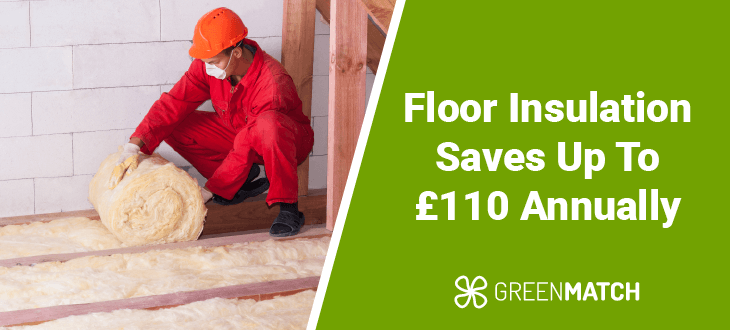Answer these simple questions and we will find you the BEST prices
Which type of solar quotes do you need?
It only takes 30 seconds
100% free with no obligation

Get Free quotes from insulation specialists near you

Save money by comparing quotes and choosing the most competitive offer

The service is 100% free and with no obligation
- GreenMatch
- Insulation
- Floor Insulation
- Floor Insulation Cost
Floor Insulation Cost: A Complete Price Guide


- On average, floor insulation in the UK costs about £850, but the final price will vary based on the type of insulation material used and the floor area size.
- An average floor insulation job can take 1 to 2 days to complete.
- Insulating a ground floor can save up to £110 annually on energy bills for a typical detached UK home, says the Energy Saving Trust.
- Insulating your floor can reduce carbon emissions by 120 to 330 kg per year, depending on the property type.
Floor insulation boosts thermal efficiency, comfort, and property value while lowering your energy bills and carbon emissions. Savings can reach £110 annually with CO₂ reductions of 330 kg, and detached homes in Northern Ireland may save up to £145. But how much does it cost to insulate your floors?
This guide breaks down floor insulation costs in the UK, including price ranges, energy savings, and installation timelines. Whether you're insulating concrete or suspended timber floors, you'll gain the insight needed to make an informed decision and explore professional assistance for your project.
Ready to insulate your floors? Look no further for a one-stop solution. By filling out our simple 30-second form, you can get up to 3 free tailored quotes from professional installers. Click below to begin!
- Describe your needs
- Get free quotes
- Choose the best offer
It only takes 30 seconds



How much does floor insulation cost in the UK?
The average cost to insulate floors in the UK is around £850, with prices ranging anywhere from £5 to £70 per m². The total cost depends on several factors, including the type of insulation material, the size of the area to be insulated, and whether you are insulating suspended timber floors or solid concrete floors.
Other factors, such as the need for professional installation and regional labour rates, can also influence the overall cost. Investing in floor insulation not only enhances energy efficiency but can also lead to significant long-term savings on energy bills.
The table below shows the costs of floor insulation based on different materials.
| Insulation type | Cost per m² | Cost per 10m² | Cost per 20m² |
|---|---|---|---|
| PIR board | £5–£15 | £50–£150 | £100–£300 |
| Polystyrene board | £10 | £100 | £200 |
| Fibreglass insulation | £10 | £100 | £200 |
| Loose-fill insulation | £10–£12 | £100–£120 | £200–£240 |
| Mineral wool insulation | £13–£17.5 | £130–£175 | £260–£350 |
| Rigid foam insulation | £21.5 | £215 | £430 |
| Open-cell spray foam | £55 | £550 | £1100 |
| Closed-cell spray foam | £70 | £700 | £1400 |
Insulation costs for different floor types
The costs for different floor insulation methods can vary significantly depending on the type of flooring—whether it's solid, suspended, or a concrete base—and the insulation material chosen. Factors such as the material's thermal efficiency, ease of installation, and thickness also play a role in determining the final cost.
| Floor type | Cost per m² |
|---|---|
| Carpeted floor insulation | £10–£30 |
| Vinyl floor insulation | £15–£40 |
| Wooden floor insulation | £15–£45 |
| Underfloor insulation | £20–£50 |
| Laminate floor insulation | £20–£50 |
| Tiled floor insulation | £25–£55 |
| Suspended floor insulation | £25–£75 |
| Concrete floor insulation | £30–£60 |
Here's a detailed breakdown of insulation costs for different types of floors, from the cheapest to the most expensive:
Carpeted floor insulation: Carpet provides natural insulation, reduces noise between floors, and offers a non-slip surface, making it a practical choice that’s easy to install. On the downside, it can trap dust, pet dander, and allergens, requiring regular cleaning to maintain a healthy environment.
Vinyl floor insulation: Vinyl is water-resistant and easy to install over various insulation types, making it suitable for moisture-prone areas like kitchens and bathrooms. However, it provides less warmth than other flooring options and can wear down more quickly in high-traffic areas.
Wooden and laminate floor insulation: Insulating wood and laminate floors enhances thermal efficiency and adds warmth and comfort underfoot. Yet wood is sensitive to moisture and temperature changes, which can cause warping, and it tends to be noisier than carpet.
Underfloor insulation: Underfloor insulation effectively reduces heat loss, improving energy efficiency across different floor types. The installation process can be invasive, especially for complex or established floor structures.
Tiled floor insulation: Insulating beneath tiles helps maintain consistent temperatures, enhancing comfort in cooler spaces like bathrooms. However, installation can be labour-intensive, and tiles may feel cool underfoot without additional heating.
Suspended floor insulation: Common in older homes with timber floors, suspended floor insulation blocks drafts and increases overall warmth. Installation can be complex and often involves lifting floorboards, which may add to the time and labour required.
Concrete floor insulation: Concrete insulation offers excellent thermal mass, helping to stabilise indoor temperatures efficiently. It requires precise installation, often using rigid insulation boards beneath or within the concrete slab, making it challenging to modify once set.
What factors influence the cost of floor insulation?
Several factors influence the overall cost of floor insulation, and understanding these can help you budget effectively and make informed decisions. Here are the key considerations to keep in mind:
Insulation material
The type of insulation material you choose impacts cost. More affordable materials, such as fibreglass or polystyrene boards, typically cost around £10 per m², while premium options like spray foam insulation can reach £70 per m². The effectiveness and longevity of the material also vary, so choosing the right one for your needs is crucial.
Area to be insulated
The larger the area, the more insulation material and labour you require. For example, insulating a large living room floor will cost more than insulating a small kitchen. Measuring the space accurately is essential to estimating the total floor insulation cost.
Installation complexity
Particular floors, such as suspended timber or when adding insulation between floors in multi-story homes, are more complicated to insulate. This complexity increases both labour and material costs. Installation is more straightforward for more straightforward floor types, like solid concrete or vinyl floors, reducing overall costs.
Labour costs
The time it takes to install floor insulation depends on the job's complexity and the area's size. On average, it can take 1 to 2 days to complete. Professional installers typically charge between £15 and £25 per hour or around £150 to £250 per day. More complex jobs, such as suspended floor insulation, may take longer and require skilled labour, increasing the overall expense.
Existing floor condition
If the floor is damaged or needs repairs before insulation can be installed, this will add to the total cost of floor insulation. For example, older homes with suspended timber floors may require additional joist work, increasing material and labour costs.
Insulation thickness
The thickness of the insulation affects both the cost and the effectiveness of the material. Thicker insulation provides better thermal performance but comes at a higher price. For instance, applying spray foam insulation at a greater thickness will increase material and labour expenses.
Area accessibility
If the floor area is difficult to access, such as tight spaces under suspended floors, it may require specialised tools or additional labour, which increases costs. Solid floor insulation is cheaper because it is easier to reach.
Grant schemes
In the UK, homeowners can benefit from several government schemes designed to improve energy efficiency and floor insulation is often covered by these grants. Programs like the Energy Company Obligation (ECO) or the Green Homes Grant (when available) provide financial support for insulation projects, making improving your home's energy efficiency more affordable.
Now that we have assessed the costs and benefits of floor insulation, it's time to hire a professional installer to take the next step in making your home more energy-efficient. Unfortunately, finding a professional at the right bargain can require endless hours of research and vetting, but luckily, GreenMatch UK can take care of this for you.
By filling out our simple 30-second form, you can receive up to 3 free home-tailored quotes from trusted local installers. Our services are entirely free of charges and obligations. Click below to begin!
- Describe your needs
- Get free quotes
- Choose the best offer
It only takes 30 seconds



FAQ
Floor insulation costs between £300 and £1,400 for a 20m² floor area, depending on the type of flooring and materials used. The cost per square metre ranges from £5 to £70, with higher costs for materials like spray foam.
The floor insulation cost per m² varies from £5 to £70, depending on the material. Fibreglass and polystyrene are more affordable, while spray foam is more expensive.
The cheapest option is fibreglass insulation, costing around £10 per m². Polystyrene boards (EPS) are another affordable choice, typically priced between £10 and £15 per m².
Insulating a floor reduces heat loss, lowers energy bills, and improves home comfort. The potential savings on energy bills make it a worthwhile investment.

Nicole Bea Kerr is a content writer for Greenmatch, leveraging her experience in B2B journalism and editing. She is interested in bringing more awareness to sustainability through informative narratives.
We strive to connect our customers with the right product and supplier. Would you like to be part of GreenMatch?

- Describe your needs
- Get free quotes
- Choose the best offer
It only takes 30 seconds



